
Briefcase Tesla coil 2009
This is
my latest easily portable mini coil which gives 2-3 inch sparks. These
are great fun and are generally safe due to low power. The are
still impressive as you can get close to them and interact with them.
This one is mains powered but setup is in seconds - open the briefcase,
drop the secondary coil in place and turn on.
It was designed as a replacement
for my original "mini" coil with a number of improvements, particularly in power,
weight and portability.
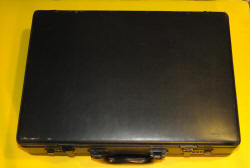
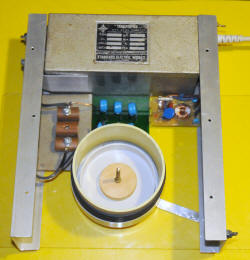
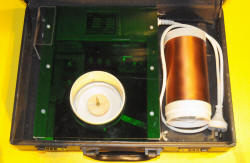
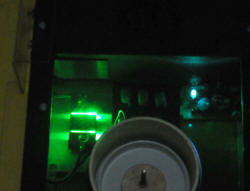
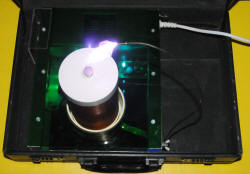
(click to enlarge)
It runs from a 4 kV 24 mA NST (neon sign transformer) with a double
spark gap made from copper pipe. The sparks from this are green through
the green tinted acrylic. The tank capacitors are 1000 pF 30 kV
ceramics. These are connected as a three strings of two (hence total is
1500 pF at 60 kV) and do get warm
in operation. The primary is 10 turns and secondary 300 turns on a 3
inch former. Sparks are up to 3 inches. Ground is to the metal chassis
which is also connected to mains ground. There is a mains interference
filter (ex microwave oven), LED indicator and switch which is simple and
compact.
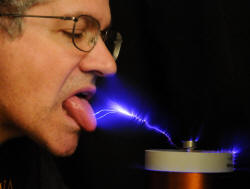
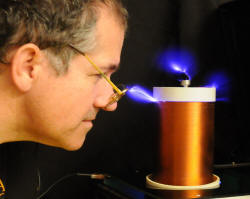 (click to enlarge)
(click to enlarge)
Above show some stunts possible due to low power.
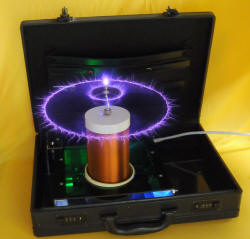
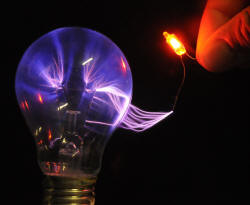 (click to enlarge)
(click to enlarge)
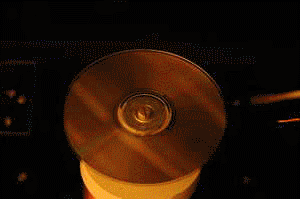
(animated - click to run)
How about CD burning, above? The spark eats away at the foil layer until
it is mostly gone. This takes up to 5 minutes.

Mini coil
2004, 2009
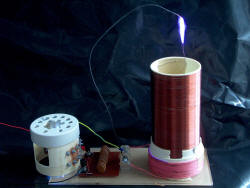
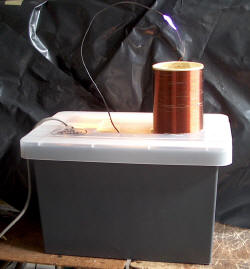
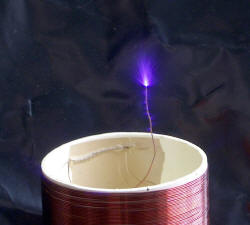
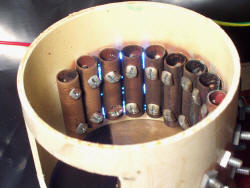
(click to enlarge)
This is a small coil running on half of an NST giving 6 kV at 30 mA .
The other half of the NST had been burnt out and increased the current
draw mildly. The spark gap used 3 segments of an 11 segment (as used by
the TCBOR and Richard Quick) gap with 1/2 inch pipe close but not
touching. If made specifically for this coil then 4 or 5 copper pipes
could have been bolted on to a flat section of acrylic or other
insulator as the geometry of the cylindrical setup is trickier. The
primary is a cylindrical 15 turns of PVC coated wire and the secondary
is about 11 inches with 260 turns of 20 G (0.031 inch = 0.81 mm)
enameled wire on a 4 inch PVC pipe. In the photo on the left you can see
corona at the top of the pink primary winding. The spacing between
primary and secondary is also from the same 4 inch PVC with two sections
cut longitudinally to allow them to snap on to the secondary. This close
coupling is not ideal probably gives this more 'transformer' action than
'resonant' action and to reduce power, it is run well away from
resonance.. The capacitor is a series connection of 13 x 100 nF 2.5 kV
ceramics giving 7.7 nF at a nominal 32 kV. There is no toroid and the
secondary earth goes to the NST and mains earth. This is about as quick,
easy and safe as they come for 2 inch sparks.
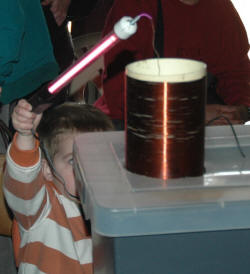
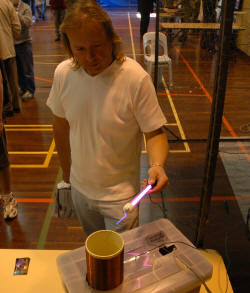 (click to enlarge)
(click to enlarge)
Above, for kids of all ages. I probably run this coil more for
demos than any other as it is quick, easy and safe.
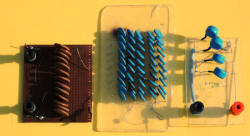
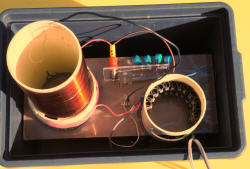 (click to enlarge)
(click to enlarge)
Above, for 2009, I have changed the caps again. The originals are shown
on the left (one string of 13 x 10 nF @ 2.5 kV = 0.77 nF 32 kV) which
lasted 20 years and have a couple of failures. The center caps
were the disastrous ones which fail after only minutes (Five strings of
10 x 10 nF @ 3 kV = 5 nF 30 kV). The new ones are on the right (2
strings of 2 x 1 nF @ 30 kV = 1 nF 60 kV) seem to work so far. I have
also removed windings back to 10 turns on the primary to improve spark
length to 2.5 inches (6 cm). Also changed the setup to have the spark
gap across the transformer secondary which gives it better protection. I
have added some mains filtering and an aluminum sheet centerpoise at the
base.
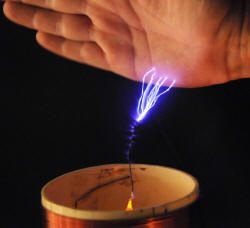 (click
to enlarge)
(click
to enlarge)
Two inch sparks onto my hand. There is some motion artifact with my hand but
not the equipment or sparks. This is done with a clear knowledge of earth
paths and at very low power levels on a small coil with no toroid
capacitance. Wetting my hand beforehand reduces the sensation to a repeated
pinprick sensation.
This coil has been popular way beyond the effort to make it. It has now
been on Australian TV on 3 occasions and
overseas on 6 (China, Holland, Norway, Switzerland, Denmark, Turkey
and likely others as well). Now on loan to the Physics Dept.

Tesla on
a car
2005
For a bit of silliness, I put the mini Tesla coil above on my car.
My Honda Civic at the time was 20 years old (which makes it
younger than the Space Shuttle). To run my stereo I have had a 300 W
inverter in there for about 15 years running a 100 W/ch hifi amp and 8
ohm speakers which used to take up all the parcel space and back seat as
well. The inverter has been utterly reliable and in the meantime I am on
to my third amplifier and third set of speakers.
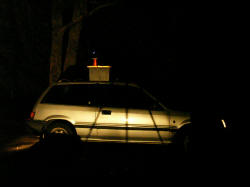 (click to enlarge)
(click to enlarge)
I simply plugged the Tesla coil in to the 300 W and put it on the roof.
It is perfectly capable of being driven around but is rather
underwhelming for that. As a precaution I earthed the car aerial but I
probably didn't need to as I have run a car radio only a foot or two
away from 4 foot sparks. I suspect they have very good static
suppression. The Honda died later that year (unrelated to the TC)
and as a mark of respect and mourning I have not bought a replacement
but use my bicycle instead. I continue to do so in 2011.
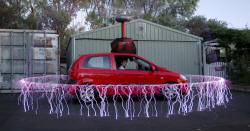 (click to enlarge)
(click to enlarge)
Of course, since 2005 I have done a lot of
TC
on a car stuff which is vastly more spectacular. If you don't see
anything else on my site, see this.

